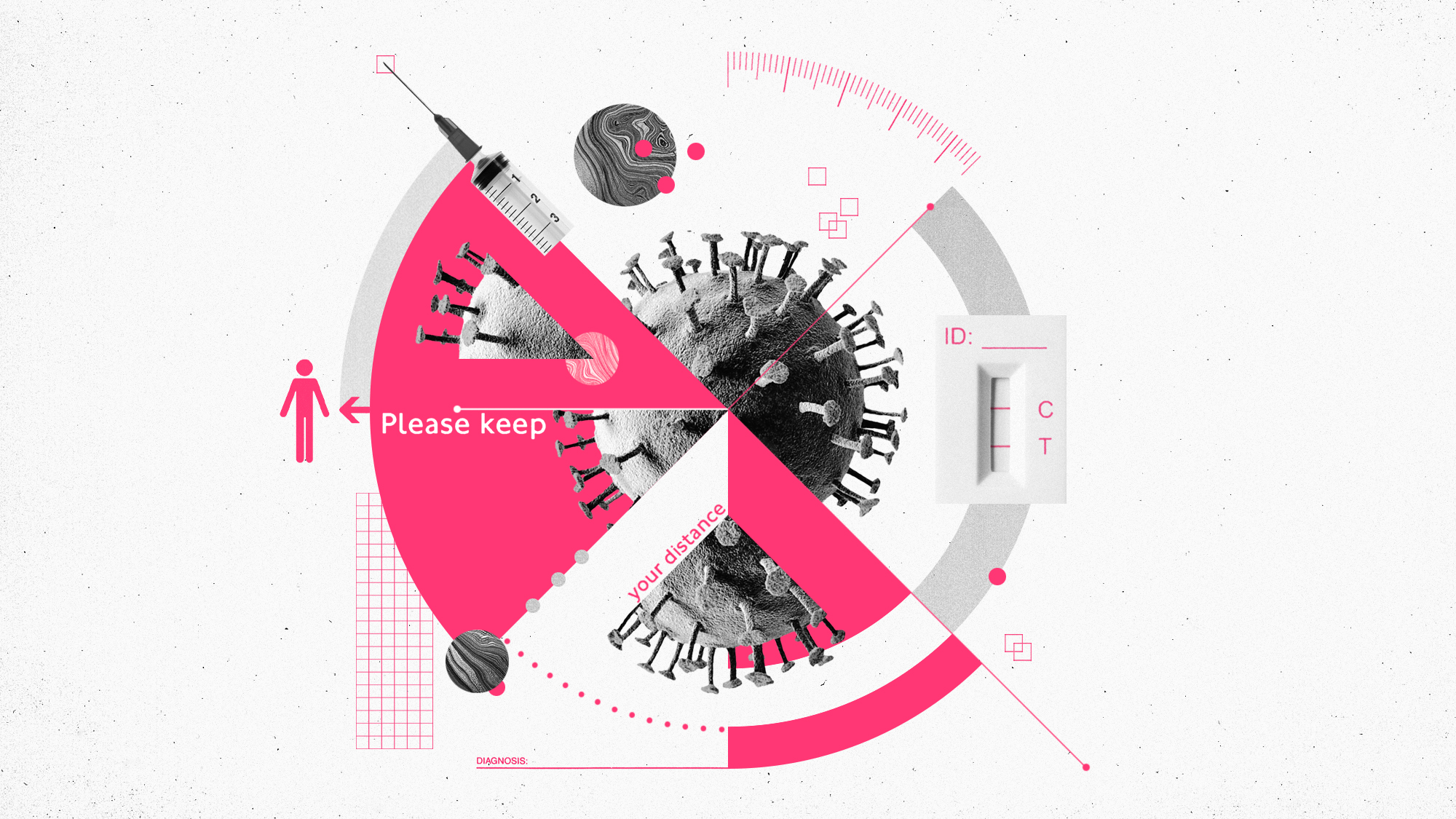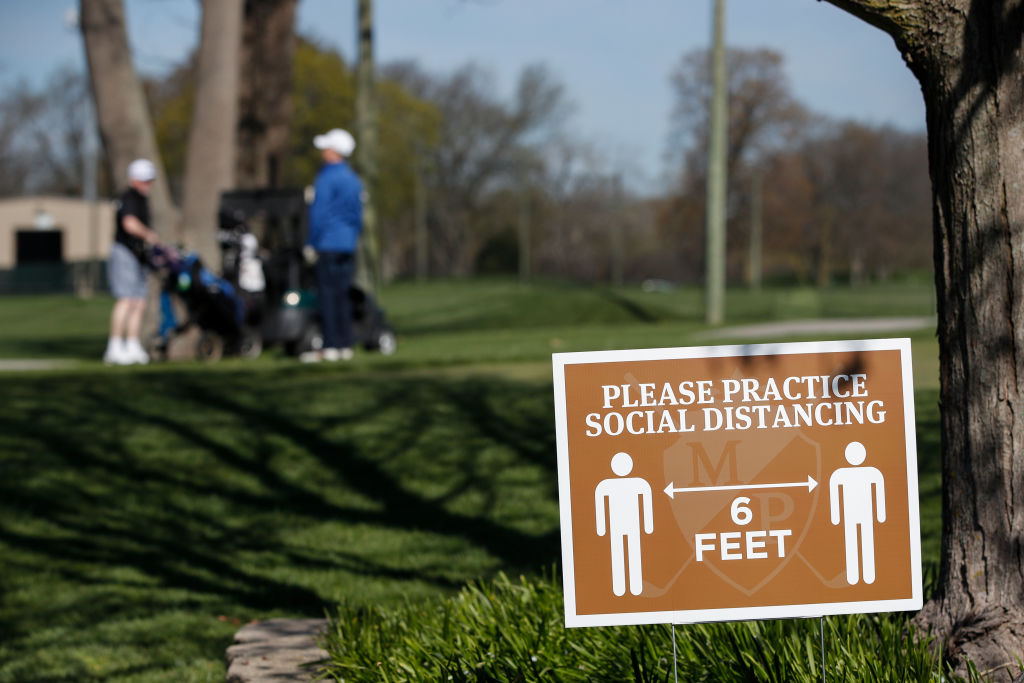The simplest explanation for the Delta surge is still the best one
How extreme contagiousness explains much of what we're seeing around the country


A free daily email with the biggest news stories of the day – and the best features from TheWeek.com
You are now subscribed
Your newsletter sign-up was successful
As the Delta variant continues to sweep through countries around the world, including countries like Australia that were once poster children for a zero-COVID strategy, it's understandable that anxiety is on the rise. Is vaccine effectiveness waning so fast that we'll all need booster shots? Is Delta more dangerous to younger people? Do we all need to go back into lockdown? And the flip side to anxiety is fatalism: If vaccine effectiveness fades so fast, why bother getting the shot in the first place?
At times like these, it's useful to take refuge in an old standby: Occam's Razor.
Occam's Razor is frequently described as a preference for the simplest explanation that fits the facts, but that's potentially confusing, as what constitutes a "simple" explanation isn't always . . . simple. We see the sun rise in the east and set in the west; the "simplest" explanation would appear to be that the sun revolves in a circle around the Earth, along with the moon and the stars. But making this "simple" explanation work required increasingly elaborate add-ons to make it fit all the observed facts. When Copernicus came along with a heliocentric model in which the Earth was only one of several planets, it didn't actually fit the facts better in the sense of being more accurate; that would come with Kepler's refinement of the model from circular to elliptical orbits, and Newton's laws that explained that motion. But it was simpler in the sense that it required substantially fewer postulates; you didn't need a complex collection of epicycles that themselves had no explanation to explain why the planets wandered around the heavens as they did.
The Week
Escape your echo chamber. Get the facts behind the news, plus analysis from multiple perspectives.

Sign up for The Week's Free Newsletters
From our morning news briefing to a weekly Good News Newsletter, get the best of The Week delivered directly to your inbox.
From our morning news briefing to a weekly Good News Newsletter, get the best of The Week delivered directly to your inbox.
So, today, we see the percentage of younger people coming down with serious illness increasing. We see states like Florida that have a roughly average vaccination rate for the U.S. suffering a huge surge of COVID deaths. We see Israel, one of the first countries in the world to vaccinate a majority of its population, suffering a brutal new wave thanks to Delta. The "simplest" explanation would seem to be that Delta is vastly more dangerous, and that the vaccines aren't working well against it.
But one thing we know for sure about Delta is that it is much more contagious than either Alpha or the original variant of COVID. So if we follow Occam's Razor, we can't adopt new postulates like these without first asking: Does the fact that Delta is more contagious adequately explain what we observe all by itself?
At this point, it looks like it might.
Consider the situation in Israel, where on its face the data suggest a marked reduction in the effectiveness of vaccines, either because Delta is successfully evading our immune system or because the vaccines' effectiveness is waning more quickly than originally expected. But the summary data may be a statistical artifact known as a Simpson's Paradox, where you need to discompose the data into more homogeneous cohorts to eliminate the effect of an exogenous variable and see what's really going on.
A free daily email with the biggest news stories of the day – and the best features from TheWeek.com
In this case, and frequently with COVID, what you need to do is break down aggregate results by age. If you look at the amalgamated data from Israel, as of Aug. 7, it showed that roughly comparable percentages of the vaccinated and unvaccinated populations came down with serious illness (frequently requiring hospitalization) due to COVID. But when you break down that result by age cohort, as the statistician Alan Salzberg did, the effect disappears; in any given cohort, the vaccines are still over 90 percent effective at preventing serious illness.
How can that be? Because the vaccine uptake in Israel has been much higher among older cohorts (as it has been in other countries as well, including the U.S.), the unvaccinated population skews much younger. So comparing the unvaccinated with the vaccinated is, in part, comparing the young and the old. And because the elderly are far more vulnerable to serious illness from COVID than the young, if you compare a younger population with less vaccine-uptake with an older population with higher vaccine uptake, the rates of serious illness due to COVID are similar — which makes it look like the vaccines aren't working even though they are. If that analysis is correct, then the surge in hospitalizations in Israel may well be adequately explained by Delta's extreme contagiousness alone, since much higher numbers of cases will inevitably mean more hospitalizations and more deaths, even if the percentage is much lower than it would have been in the absence of widespread vaccinaton.
Does that mean we don't need booster shots? It might — we need to do more research on the question. There's certainly reason to pursue boosters for those who are most vulnerable, as they are unlikely to do any harm. But as David Leonhardt points out, the overwhelming priority still needs to be vaccinating the unvaccinated — and harping on the need for boosters may actually hamper that effort by suggesting that vaccines don't actually do much good.
Simpson's Paradoxes abound in COVID data. Consider Florida, which has concerned observers since overall vaccination rates are much higher there than in states like Alabama or Mississippi, and yet the state has been hammered nearly as badly during the Delta wave. Their similar trajectories may induce skepticism about whether the vaccines are working, but if you break the data down by geography, it's clear that vaccinations are having a powerful effect. For example, hospitalizations have surged far more dramatically in Duval county (fully-vaccinated rate: 46.5%) than in Miami-Dade county (fully-vaccinated rate: 66.2%).
Demographic breakdowns reinforce the same message. The rise in the relative proportion of younger (meaning non-elderly) adults among the hospitalized and killed is a testament to the high-uptake of vaccines by the elderly, and more evidence of the vaccines' effectiveness. But even that high uptake has left a large absolute number of elderly Floridians unvaccinated — particularly in nursing homes, where Florida ranks near the bottom of the nation in terms of the percentage of both residents (73.1%) and staff (47.5%) who are vaccinated. Vaccines are working — there just aren't enough people vaccinated to prevent a surge in serious illnesses, and deaths, given the extreme contagiousness of Delta.
That's good news, ultimately, since the vaccines are still readily available, at least in America. The bad news is that Occam's Razor can require a certain amount of statistical sophistication to wield correctly, so you slice the data properly and don't butcher it. That's a bit much to expect of the average citizen. But it's not too much to expect of our government officials or our media, who ought to be able to see the simple truth, and tell it without alarmism or obfuscation.
Noah Millman is a screenwriter and filmmaker, a political columnist and a critic. From 2012 through 2017 he was a senior editor and featured blogger at The American Conservative. His work has also appeared in The New York Times Book Review, Politico, USA Today, The New Republic, The Weekly Standard, Foreign Policy, Modern Age, First Things, and the Jewish Review of Books, among other publications. Noah lives in Brooklyn with his wife and son.
-
 Why is the Trump administration talking about ‘Western civilization’?
Why is the Trump administration talking about ‘Western civilization’?Talking Points Rubio says Europe, US bonded by religion and ancestry
-
 Quentin Deranque: a student’s death energizes the French far right
Quentin Deranque: a student’s death energizes the French far rightIN THE SPOTLIGHT Reactions to the violent killing of an ultra-conservative activist offer a glimpse at the culture wars roiling France ahead of next year’s elections.
-
 Secured vs. unsecured loans: how do they differ and which is better?
Secured vs. unsecured loans: how do they differ and which is better?the explainer They are distinguished by the level of risk and the inclusion of collateral
-
 Why some people remember dreams and others don't
Why some people remember dreams and others don'tUnder The Radar Age, attitude and weather all play a part in dream recall
-
 What does Covid look like in 2024?
What does Covid look like in 2024?Today's Big Question Disease experts are calling for closer monitoring as new variant fuels rise in infections
-
 Even New York City rats can get COVID, study finds
Even New York City rats can get COVID, study findsSpeed Read
-
 COVID 'lab leak' theory: Does the DOE's assessment hold water?
COVID 'lab leak' theory: Does the DOE's assessment hold water?Instant Opinion The sharpest opinions on the debate from around the web
-
 WHO chief says COVID's end is 'in sight'
WHO chief says COVID's end is 'in sight'Speed Read
-
 COVID elevates risk of neurological issues, study suggests
COVID elevates risk of neurological issues, study suggestsSpeed Read
-
 CDC relaxes COVID-19 guidelines on quarantines, social distancing
CDC relaxes COVID-19 guidelines on quarantines, social distancingSpeed Read
-
 FDA restricts Johnson & Johnson COVID vaccine due to blood clot risk
FDA restricts Johnson & Johnson COVID vaccine due to blood clot riskSpeed Read
